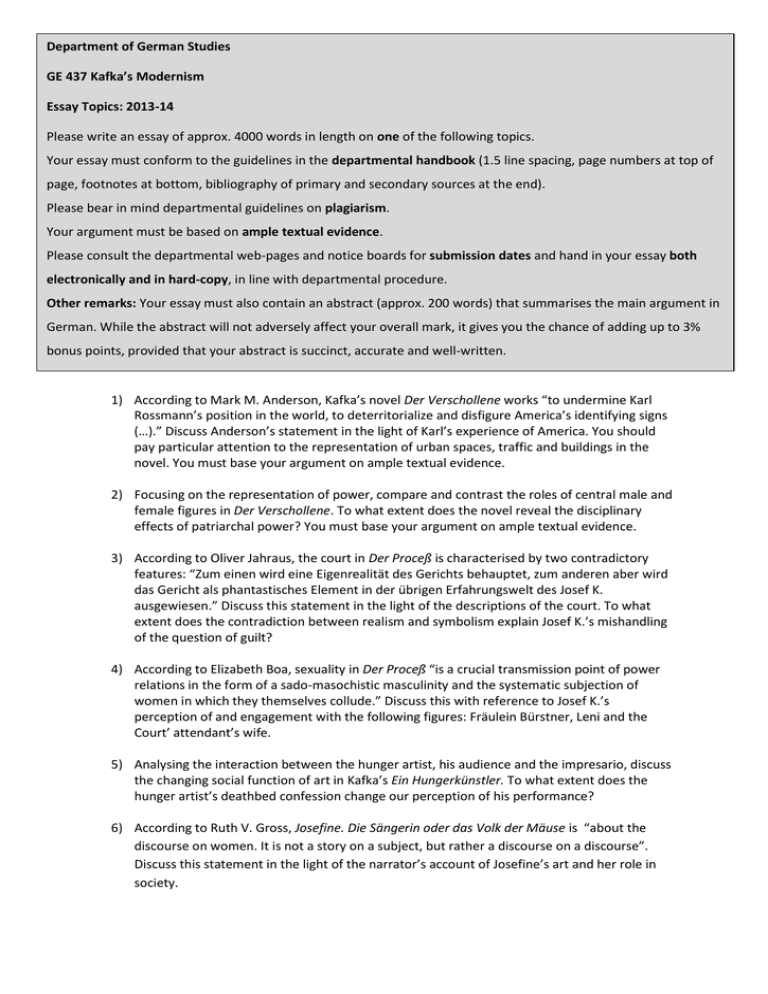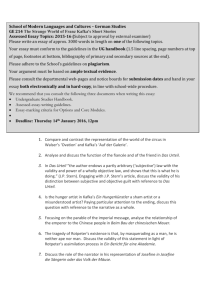one departmental handbook
advertisement

Department of German Studies GE 437 Kafka’s Modernism Essay Topics: 2013-14 Please write an essay of approx. 4000 words in length on one of the following topics. Your essay must conform to the guidelines in the departmental handbook (1.5 line spacing, page numbers at top of page, footnotes at bottom, bibliography of primary and secondary sources at the end). Please bear in mind departmental guidelines on plagiarism. Your argument must be based on ample textual evidence. Please consult the departmental web-pages and notice boards for submission dates and hand in your essay both electronically and in hard-copy, in line with departmental procedure. Other remarks: Your essay must also contain an abstract (approx. 200 words) that summarises the main argument in German. While the abstract will not adversely affect your overall mark, it gives you the chance of adding up to 3% bonus points, provided that your abstract is succinct, accurate and well-written. 1) According to Mark M. Anderson, Kafka’s novel Der Verschollene works “to undermine Karl Rossmann’s position in the world, to deterritorialize and disfigure America’s identifying signs (…).” Discuss Anderson’s statement in the light of Karl’s experience of America. You should pay particular attention to the representation of urban spaces, traffic and buildings in the novel. You must base your argument on ample textual evidence. 2) Focusing on the representation of power, compare and contrast the roles of central male and female figures in Der Verschollene. To what extent does the novel reveal the disciplinary effects of patriarchal power? You must base your argument on ample textual evidence. 3) According to Oliver Jahraus, the court in Der Proceß is characterised by two contradictory features: “Zum einen wird eine Eigenrealität des Gerichts behauptet, zum anderen aber wird das Gericht als phantastisches Element in der übrigen Erfahrungswelt des Josef K. ausgewiesen.” Discuss this statement in the light of the descriptions of the court. To what extent does the contradiction between realism and symbolism explain Josef K.’s mishandling of the question of guilt? 4) According to Elizabeth Boa, sexuality in Der Proceß “is a crucial transmission point of power relations in the form of a sado-masochistic masculinity and the systematic subjection of women in which they themselves collude.” Discuss this with reference to Josef K.’s perception of and engagement with the following figures: Fräulein Bürstner, Leni and the Court’ attendant’s wife. 5) Analysing the interaction between the hunger artist, his audience and the impresario, discuss the changing social function of art in Kafka’s Ein Hungerkünstler. To what extent does the hunger artist’s deathbed confession change our perception of his performance? 6) According to Ruth V. Gross, Josefine. Die Sängerin oder das Volk der Mäuse is “about the discourse on women. It is not a story on a subject, but rather a discourse on a discourse”. Discuss this statement in the light of the narrator’s account of Josefine’s art and her role in society.
